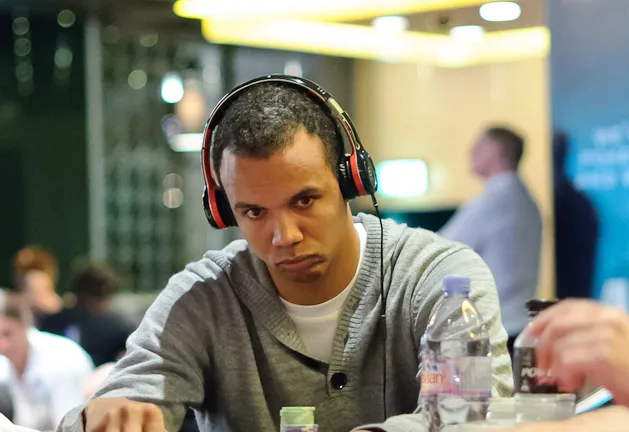It Ain't Personal


A 15-minute hand went down right before the last break over at Phil Ivey's table involving Ivey and a bit of controversy. Hopefully we can paint a correct picture to describe exactly what happened.
We picked up the action on the board of 


 and Ivey had reached for chips. He picked up eight purple T500 chips and moved them forward with his hand. Ivey quickly dropped four of the chips and then the other four right next to the first, almost in one motion but with a slight hitch in between. The bet was for 4,000, but the dealer at the table called a string bet on Ivey. Ivey didn't seem to believe what he did was a string bet and either did a couple of others at the table, but some of the players, including his opponent, deemed this a string bet. The dealer attempted to explain that it was going to be ruled a string bet, but Ivey requested a floor ruling. The floor was summoned and the explanation of what happened began.
and Ivey had reached for chips. He picked up eight purple T500 chips and moved them forward with his hand. Ivey quickly dropped four of the chips and then the other four right next to the first, almost in one motion but with a slight hitch in between. The bet was for 4,000, but the dealer at the table called a string bet on Ivey. Ivey didn't seem to believe what he did was a string bet and either did a couple of others at the table, but some of the players, including his opponent, deemed this a string bet. The dealer attempted to explain that it was going to be ruled a string bet, but Ivey requested a floor ruling. The floor was summoned and the explanation of what happened began.
The dealer picked up some chips from her rack and began to show the floor what Ivey did, except she wasn't exactly doing the motion like Ivey did. Instead of a nearly fluent movement of the two drops of the chips, the dealer had cocked her hand back much more when firing the second batch and there was also a bit more time in between the two drops. This isn't what Ivey did and he tried to show the floor himself what his motion was. Still, the floor ruled that the motion was a string bet and Ivey could only bet 2,000.
At the time, the player in Seat 8, but not Ivey's opponent in this hand, was very adamant that the action was a string bet. He even commented, "In America they allow that, but in Australia it's a string bet."
Then, Ivey's opponent raised to 6,000. At this time, the floor that made the ruling of a string bet went to find another, more senior floor member. The new floor came and, while Ivey was in the tank facing the raise to 6,000, explained that it must stand as a bet of 2,000. Then, the floor walked away. Little did he know, he'd be back again shortly for another ruling in the same hand.
Ivey tanked for a bit and then put in a reraise to 13,100. His opponent stuck all of his chips in, the two players tabled their hands — 
 for Ivey and
for Ivey and 
 for his opponent — and the dealer ran out the
for his opponent — and the dealer ran out the  for the river card. Then, the dealer counted Ivey's opponent's stack, which came out to be 16,100 — 3,000 more than what Ivey had raised to.
for the river card. Then, the dealer counted Ivey's opponent's stack, which came out to be 16,100 — 3,000 more than what Ivey had raised to.
Ivey hadn't said anything when his opponent pushed his chips into the pot following Ivey's raise. He didn't say call, he didn't say fold. He said nothing. Both Ivey and his opponent tabled their hands and the dealer ran out the board.
Now, the dealer explained that Ivey owed 3,000 more, but he had only raised to 13,100 and didn't believe he should just have to pay it straight away. Once again, the floor staff was summoned and the situation was explained. The floor seemed to believe that Ivey's intention was to put his opponent all in. Ivey was kind enough to admit that his intentions were to raise the player all in, but he had simply counted out the wrong amount of chips. The floor was then trying to rule that because of Ivey's intentions, he should pay the extra 3,000. This brought things back to the first time the floor was called about the string bet because, then, Ivey's "intentions" were to bet 4,000 and not 2,000.
The floor stepped away from the table for a brief few moments and then came back to rule that Ivey was not obligated to pay the extra 3,000. Instead, the amount of 13,100 would stand and that's all the player was awarded.
This entire situation took about 15 minutes or so and drained a lot of playing time for the players during that level. No penalties were given.
After the hand, PokerNews sought out one of the senior tournament directors and asked about the rulings that were given. It was stated that Ivey's first motion shouldn't have been called a string raise and the second ruling was correct in that Ivey shouldn't be forced into paying the extra 3,000. The tournament director also stated that all of this controversy that happens so often with poker players and their betting/raising amounts could simply be cleared up if players verbalized their actions.
| Player | Chips | Progress |
|---|---|---|
|
|
128,500
-6,500
|
-6,500 |
|
|
||



